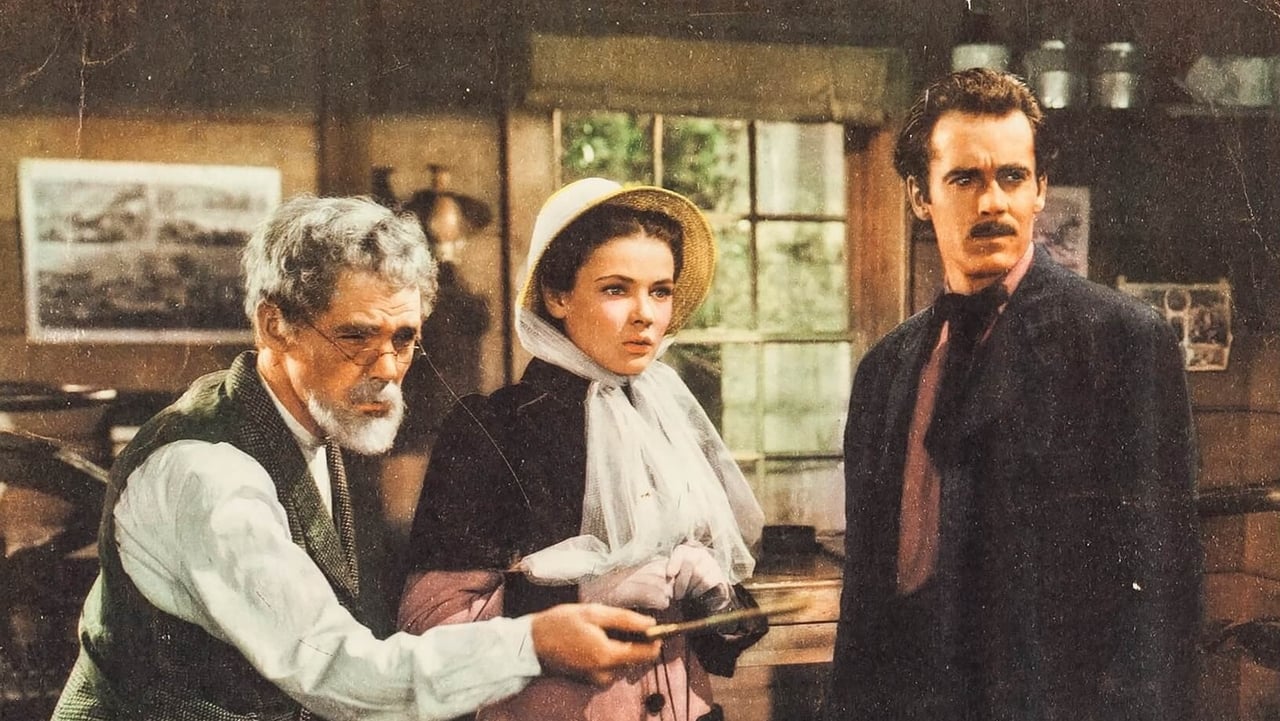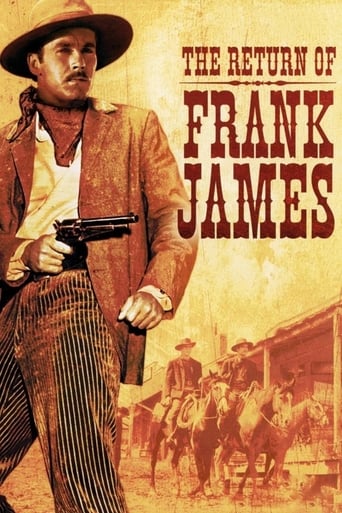

THE RETURN OF FRANK JAMES (20th Century-Fox, 1940), directed by Fritz Lang, is a continuation to the 1939 blockbuster hit JESSE JAMES (1939) starring Tyrone Power and Henry Fonda as the outlaw James brothers. Repeating its opening and closing credit score conducted for JESSE JAMES, along with its Technicolor splendor and location filming that served the earlier film so well, FRANK JAMES elevates Fonda from secondary character to top draw leading attraction. While this extension might have reused the services of JESSE JAMES director Henry King, it comes of a surprise in having, not Howard Hawks or John Ford whose best films happen to be westerns, but the European born Fritz Lang. Yet, under his watch, the result of THE RETURN OF FRANK JAMES is every bit as good as the original.The fade-in begins with the closing minutes of JESSE JAMES where the wanted outlaw (Tyrone Power) gets shot in the back by his friend, Bob Ford (John Carradine) as his brother, Charlie (Charles Tannen) watches. Eliminating the eulogy given by Rufus Cobb (Henry Hull) that closed the original film, THE RETURN OF FRANK JAMES opens its new chapter with newspaper headlines depicting the death of the notorious outlaw, and the disappearance of his brother, Frank James, after the Northfield robbery, now believed to be dead. Frank (Henry Fonda), however, isn't dead, but living a secluded farm life in the Ozarks under an assumed name of Ben Woodson. He's accompanied by the family farmhand, Pinky Washington (Ernest Whitman), and Clem (Jackie Cooper), an orphan teenager whom Frank had taken in following the death of his father. It is Clem who runs over to Frank with the news about Jesse James murder and the arrest of the Ford brothers. After learning the Fords were set free from the judge a half hour of the guilty verdict from the jurors, and having collected the $10,000 reward on Jesse, dead or alive, Frank breaks from his seclusion to take the law into his own hands by avenging his brother's killers. Along the way Frank and Clem, now acting as his tag-along sidekick, encounter Eleanor Stone (Gene Tierney), a reporter for the Denver Star, hoping for a good story or else her father Randolph (Lloyd Corrigan), owner of the newspaper, would send her off to college instead.Aside from the tobacco chewing Henry Fonda playing Frank James, others reprising their original roles from JESSE JAMES include the ever reliable Henry Hull (Major Rufus Cobb, editor of the Liberty Weekly Gazette still using the catch phrase, "Shoot them down like dogs"); J. Edward Bromberg (George Runyan, the railroad detective out to expose Ben Woodson as Frank James); Donald Meek (McCoy, the railroad president responsible for having the Ford brothers betray their leader, Jesse, and arranging for their pardon); and George Chandler(Roy, Cobb's typesetter). New members of the cast include George Barbier (Judge Ferris); Eddie Collins (The Station Agent); Barbara Pepper (Nellie Blane, stage actress); and Victor Kilian (The Fanatic Preacher).For Gene Tierney's movie debut, she gets no special introduction in the credits. Only her name comes billed second under Henry Fonda, which is an honor for any newcomer. A dark beauty with girlish sounding voice reminiscent in both factors to an early 1930s actress, Sidney Fox (best known for 1932s "Murders in the Rue Morgue"), Tierney doesn't play a love interest but one interested in reporting the news that's fit to print. She does quite well in her first try as a movie actress, and would improve with each succeeding movie before reaching her peak with LAURA (20th Century-Fox, 1944).As with JESSE JAMES, THE RETURN OF FRANK JAMES, with original screenplay by Sam Hellman, toys with the facts, resulting to better screen entertainment. While the first hour depicts on Frank's vengeance on the Ford brothers, with a tense moment having the Fords acting on a stage play "The Death of Jesse James" observe Frank sitting in the theater box looking down at them, the second half shifts to courtroom proceedings with Frank accused of a murder and Major Cobb acting as his defendant. Though Fritz Lang may have avoided borrowing from Henry King's directorial style from JESSE JAMES, interestingly, the courtroom segment comes as a sheer reminder to John Ford's YOUNG MR. LINCOLN (1939) also starring Henry Fonda, by using humor over tense action for the proceedings. Like King, Lang keeps the pace moving with exciting horseback chases and shootouts, something very much expected for any western.Though the second and last of the Frank and Jesse James westerns for the studio, this wasn't the last depiction on their lives presented on screen. Lippert Studios independently produced two totally different adaptations, I SHOT JESSE JAMES (1949) and THE RETURN OF JESSE JAMES (1950), with the latter co-starring Henry Hull in a different character portrayal. Other numerous westerns on the Jesse and Frank James would follow for many years to come.Distributed to home video and later DVD, THE RETURN OF FRANK JAMES consisted of cable TV broadcasts as Turner Network Television (1994-95); American Movie Classics (1999-2005); Fox Movie Channel, Encore Westerns, Turner Classic Movies (TCM premiere: December 27, 2012), among others. With this much television exposure, Frank James should become more legendary than his kid brother, Jesse. (***1/2)
... View MoreAs sequels go, this is a pretty good one. Of course, it's a rare Henry Fonda film that isn't at least "pretty good". But, this film doesn't have one major ingredient the original film had -- Tyrone Power.Nevertheless, Fonda is very good here, as is Gene Tierney in her first starring role. Jackie Cooper was believable as the "kid" who acts before he thinks, which provided some of the key plot twists. Henry Hull is fun as the newspaper editor, though I think the part had a bit of overacting in it...though my guess is that that was done at the behest of this (and the previous) directors. Through a key role, John Carradine's part here is rather short on screen time. It's always fun seeing the meek one in a supporting role -- Donald Meek.Nice Technicolor here, although the print being shown on TCM is faded in a few scenes. And I give credit to the producers -- the scenes shown in and around Denver do look like the areas in and around Denver...although there were shot in the Sierra Nevada area...but it's close and realistic.Well worth watching, though best if you watch the Tyrone Power prequel first. But just remember...in terms of actual history -- there's not much here.
... View MoreReturn of Frank James, The (1940) *** (out of 4) Fritz Lang directed this sequel to Jesse James, which picks up right after the Ford Brothers shot Jesse in the back. Hearing that the brothers got off with murder, Frank (Henry Fonda) comes out of retirement to seek revenge. This film isn't quite as good as the original but it's still a very worthy follow up with strong direction and some really good performances. Fonda is good as usual but it's Henry Hull who steals the show as the grumpy newspaper owner. John Carradine, Gene Tierney and Jackie Cooper are all equally impressive. The ending is terrific but I personally thought the courtroom scene went a little too over the top in the comedy.
... View MoreA mixed bag here, with some fine cinematography and lead acting by Henry Fonda, honing up his taciturnity for its zenith in "My Darling Clementine" let down by some poor supporting acting from Gene Tierney (too soft-soap bland), Henry Hull (so over the top you wonder if Bugs Bunny's animators adapted him as the prototype for Yosemite Sam) and Jackie Cooper, (too old and goshdarn winsome for his part as Jesse's adolescent son) and worst of all a stereotyping of negroes which would have put "Gone with the Wind" to shame - we even get the word "darky" jarringly shoved in our faces twice. That the plot veers so drastically from the truth also mars believability not to mention credibility. Maestro Lang seems to me let down by some poor second unit work - there are some poor horse-riding process shots and an awful "dummy death down a cliff" and yet the landscapes are on a par with Ford and Mann and the action scenes have zip. I believe this was Fritz Lang's first Western outing and I think it shows. I prefer his film - noir work where he could more employ his expressionistic genius but this colourful potboiler entertains enough.
... View More